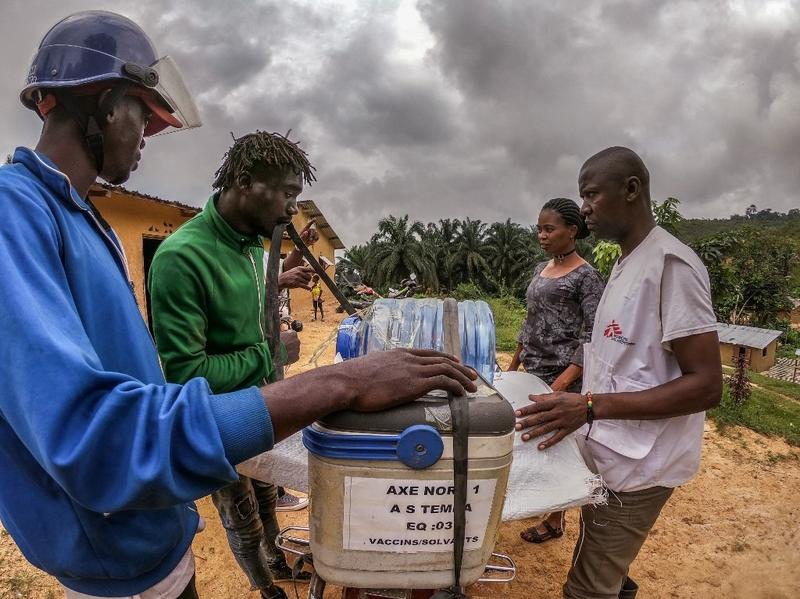 In this March 3, 2020 photo, a motorcycle driver loads vaccines to be transported in further rural areas in Temba, near Seke Banza, western Democratic Republic of Congo. (JUNIOR KANNAH / AFP)
In this March 3, 2020 photo, a motorcycle driver loads vaccines to be transported in further rural areas in Temba, near Seke Banza, western Democratic Republic of Congo. (JUNIOR KANNAH / AFP)
KINSHASA - When Ebola hit the city of Mbandaka in northwest Congo in 2018, health officials had to act fast - the city was connected via regular boat service to the sprawling capital Kinshasa, where the deadly virus could spread out of control.
Between 2018-20, health workers inoculated more than 400,000 people in three Ebola outbreaks, lugging vials colder than an Antarctic winter across warm forests and along mud-clogged mountain roads
Unlike in previous outbreaks, they had a new weapon - an experimental vaccine that could revolutionise the fight against Ebola - if they could keep the vials between minus 60-80 degrees Celsius in tropical humidity and across rough terrain.
As the world embarks on an unprecedented campaign to bring ultra-cold COVID-19 vaccines to billions in remote areas, Democratic Republic of Congo’s experience holds vital lessons in distributing the vaccine and gaining the trust of those receiving it.
Congo itself will aim to use the technology and local expertise to get its people vaccinated against COVID-19. The country has recorded over 15,000 cases and 369 deaths from the virus, and faces a second wave of infections.
ALSO READ: UNICEF launches COVID-19 vaccine market dashboard
Between 2018-20, health workers inoculated more than 400,000 people in three Ebola outbreaks, lugging vials colder than an Antarctic winter across warm forests and along mud-clogged mountain roads. When cars could not pass, they drove motorbikes. If water was the only way, they used canoes.
“These roads are often flooded during the rainy season. A lot of times you have to cross rivers that may not have bridges,” said John Johnson, an immunisation and outbreak response advisor for French medical charity Medecins Sans Frontieres (MSF).
It was the largest ever roll-out of an ultra-cold chain vaccine, said a spokesperson for GAVI, an alliance of governments, drug companies and charities that arranges global vaccination campaigns.
In Mbandaka, full-scale crisis was averted. The vaccine, and well drilled health protocols, contained the virus.
Giant thermos
Key to the roll-out was a high-tech thermos that could fit on a motorbike or in a canoe and keep vials cold for a week - essential in Congo where fewer than one in 10 people have access to electricity.
The Arktek device works like a giant coffee thermos that can be filled with hundreds of vaccines, and special ice packs made of various materials.
Produced in China by Aucma and retailing for around US$2,300 per unit, it was developed in 2014 to store polio vaccines at 2-8 degrees Celsius, and tweaked when Merck’s Ebola vaccine was approved for use in Guinea and Sierra Leone during a 2013-16 outbreak.
“Like most thermoses designed to keep your coffee hot or a cold drink cold, they use a vacuum to shield the product from the environment,” said Daniel Lieberman from the Global Health Labs (GHL), a non-profit research organisation created by the Gates Foundation which helped design it.
In Congo, they found the best ice packs used salt water, which kept the vaccine frozen for up to a week without power.
Health teams in Congo set up a network of deep freezers from which the Arktek was deployed. That helped medics reach remote areas and end an epidemic in the east that killed over 2,200 people in two years, the second-worst Ebola outbreak in history.
GHL is now retuning the Arktek for use with dry ice, which could keep up to 1,500 doses of Pfizer-BioNTech’s COVID-19 vaccine frozen for several weeks.
Winning trust
Advances in cold chain technology mean little if health workers do not earn public trust and dispel misinformation about vaccines.
WHO officials say that during Congo’s 2018-20 Ebola outbreak, they made the mistake of not employing local health workers.
Rumours spread that the vaccine would make men weak, woman infertile and children less intelligent. More than 300 attacks on health workers were recorded, leaving six dead.
“They need to understand what they’re getting and the risks and the benefits. The mistake that’s often made is in watering down the message and making it too simple,” MSF’s Johnson said.
The WHO used only local healthcare workers to distribute the vaccine in a subsequent outbreak in the west, which ended in six months with 55 deaths.
Vaccine scepticism is not confined to central Africa. A 2018 study of 140 countries by the London-based Wellcome Trust medical charity found that low-income regions tend to have higher confidence that vaccines are safe than high-income ones.
READ MORE: Pfizer, BioNTech vaccine wins European backing
A third of people in the United Kingdom say they have seen messages discouraging the public from getting a coronavirus vaccine, according to research by King’s College London and British research company Ipsos MORI.
It is essential to address doubts now, before mass COVID-19 vaccination campaigns begin, said Touré Alhassane, who led the WHO’s vaccine rollout during Congo’s latest Ebola outbreak, which ended in November.
“Even if you have all the money in the world, and you have everything to implement it, if the community are not with you, you are not going to succeed,” he said.


